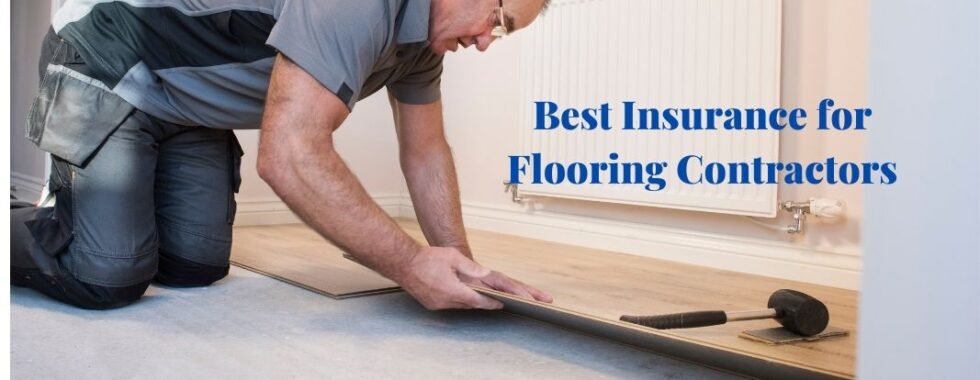
Best Insurance Coverage for Flooring Contractors
Floor coverings are installed in all buildings, from residential to commercial. There are many different floor coverings including carpet, tile, wood flooring, and laminate.
Flooring installers spend a lot of time kneeling or sitting on floors while working with many different tools. This profession certainly carries the risk of serious injury if an accident were to happen.
Easy Article Navigation
- General Liability Insurance
- Workers’ Compensation Insurance
- Commercial Auto Insurance
- Tools and Equipment Coverage
- In Conclusion
But there are other risks inherent to the flooring contractor industry that are present every day and on every job site. The good news is that these risks can be transferred to a commercial insurance policy at affordable prices.
However, depending on your flooring business, there is a handful of insurance policies that flooring contractors need to make certain the business is well protected from everyday risks.
In this article, we’ll present a package of coverages that will protect the flooring contractor and his or her business from lawsuits and claims that can be financially devastating.
General Liability Insurance
For every business, general liability coverage serves as the foundation of a well-built commercial insurance package. Every flooring contractor must have this coverage and in fact, the state you operate in will likely include general liability in their licensing requirements.
General Liability Insurance will include:
- Bodily Injury Liability – Provides coverage for bodily injury caused by the insured or an employee to your customer or other third parties.
For example, if you or an employee leave a sharp tool at the job site and your customer or another third party accidentally steps on that tool and is injured, your general liability insurance would pay for any medical bills or loss of income that might result from the accident.
- Property Damage Liability – This coverage protects you and your business from liability arising from damages caused by your operation at the job site.
For example, while using a rotary floor sander, you accidentally cause damage to an expensive piece of furniture, your property damage liability coverage will pay to repair or replace the damaged furniture that might be worth thousands of dollars.
- Medical Payments – Provides coverage for applicable medical costs by someone injured and needing medical treatment due to an accident at the job site without having to prove liability. Medical payments is available for any medical costs resulting from a minor injury at the job site (excluding you and your employees) without the requirement of proof of liability.
- Personal / Advertising Injury – Third-party injury is often the result of libel, slander, copyright infringement, invasion of property, or loss caused by your marketing or advertising. These are covered under your policy for an individual’s reputation or rights.
- Products-Completed Operations – Provides coverage for liability arising out of the insured’s products or business operations conducted away from the insured’s premises (typically at the job site). These types of claims generally come up after weeks, months, or years after the job has been completed.
Finally, one of the greatest benefits of having general liability insurance is the insurer’s duty to defend you and your business in a business-related lawsuit. Your GL insurance will pay for your defense costs and any financial judgment awarded by the court.
Worker’s Compensation Insurance
Although your general liability insurance (GL) will pay for injuries to a third party that you are liable for, any job-related injuries or illnesses to employees and covered subcontractors are covered by your Workers’ Compensation Insurance.
In fact, most states require a flooring contractor to prove this coverage is in force before they will issue a license to operate in their state.
Your workers’ compensation policy provides comprehensive benefits for covered employees and uninsured subcontractors:
- Medical benefits that pay healthcare costs for a work-related injury or illness.
- Loss of income benefits that will pay a portion of an insured’s lost wages resulting from a work-related injury or illness.
- Death Benefit payable to the surviving family of an insured killed on the job
- Burial Benefit payable for a portion of funeral and burial expenses
Commercial Auto Insurance
Any vehicles used for your business, whether personally owned or owned by the business must be insured under a commercial auto policy.
A lot of flooring contractors who use a personally owned pickup truck or cargo van assume that their personal auto insurance will cover the personal vehicle they use for their business.
The truth is that most personal auto policies will not cover a claim if the insured vehicle is primarily used for business. Why risk having a claim denied under a personal auto policy when you can purchase a commercial auto policy with better rates and higher limits?
If you are contracted by a large corporation or government entity, you’ll likely have to provide proof of vehicle insurance with limits of $1 million or $2 million. Your auto insurance will generally not offer the higher limits that you require.
Moreover, your commercial auto policy will not limit the number of vehicles or drivers to be insured and if higher limits are required, you can purchase a commercial umbrella policy to add an additional layer of protection up to 5 or 10 million dollars.
Tools and Equipment Coverage
One of the most frequent errors made by contractors is assuming that their tools and equipment are covered by their commercial auto insurance. Not true.
To cover expensive tools and equipment while in storage, in transit, or at the job site, flooring contractors should purchase an Inland Marine policy that will cover your tools and equipment if damaged because of a covered peril or stolen.
Additionally, your inland marine policy will value your tools based on an appraised value or replacement cost at the time of a claim.
Flooring installers typically use expensive tools and equipment at every job site, so consider the hit your bottom line would take if you had to replace all of them because they were stolen from your workshop or trailer or destroyed in a vehicle accident.
In Conclusion
Every contracting business faces financial risks every day you’re open for business and every one of those risks can be transferred to a highly-rated insurance company at affordable rates.
If you are a new flooring contractor or an existing one that is concerned about the insurance package covering your business, you should shop your insurance with a company that understands the risks associated with being in the contracting business.
When you speak with an independent insurance professional at Fairbanks Insurance Brokers you will have access to people who understand the risks inherent to your industry and can provide a package of coverages that will bring peace of mind knowing that when something goes wrong (and it will), you and your business will be financially protected.
Here’s What We Recommend
General Liability: Contractors General Liability will be the foundation of protection for your business. The coverage will respond if you or your employees are found liable for bodily injury, property damage, or have a products/completed operations complaint. The coverage also covers defense costs for your business to respond to any lawsuits brought by a third party.
Workers’ Comp: Many states will require contractors to provide workers’ compensation coverage for their workers before they can begin a project. Accidents will happen at the job site that can result in an employee becoming injured and missing work. Your workers’ compensation coverage will provide financial assistance for medical expenses and lost wages.
Surety Bonds: It’s very likely that your state will require you to be licensed before you can begin operations. Most states and customers will require contractors to offer a license or surety bond before you are allowed to bid on a job or begin working.
Commercial Auto: Typically, most contractors will have light and heavy vehicles that require commercial auto insurance to make certain their vehicles can be repaired or replaced in the event of an accident, vandalism, or theft.
Tool Coverage: Also known as Inland Marine Insurance, this policy will provide for reimbursement for expenses to repair or replace tools and equipment. Your tools represent an important part of your livelihood, so we always encourage carpentry contractors to consider this valuable coverage.
Get A Quote


